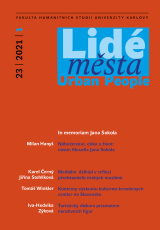Náboženství, etika a život
Nástin filosofie Jana Sokola
DOI:
https://doi.org/10.14712/12128112.2429Klíčová slova:
Czech philosophy, Philosophy of life, Jan Sokol, Czechoslovakian Studies, Religion, EthicsAbstrakt
This study discusses the essential contributions concerning religion, ethics, and life of the recently deceased Czech philosopher and Charter 77 signatory, Jan Sokol. It argues that Sokol’s broad interests and contributions to many fields, ranging from religious studies, philosophical anthropology, to the philosophy of law, are embedded into a broadly conceived philosophy of life influenced mainly by the French philosopher, scientist, and Jesuit, Teilhard de Chardin. After encountering the works of Teilhard in the 1960s, Sokol began to elaborate his own philosophy of life, which enabled him to converge his interests in the sciences and phenomenology with his faith in biblical creation. The study shows how Sokol’s understanding of religion and ethics is intrinsically interwoven with his concept of life and evolution, and so it forms, as it were, the core of his thought underlying many of his interests and contributions. Particular attention is paid to the phenomenon of rhythm, which, according to Sokol, permeates both cultural and organic, as well as non-organic, nature, and exemplifies an underlying unity of the world.
Stahování
Publikováno
Jak citovat
Číslo
Sekce
Licence
Copyright (c) 2022 Milan Hanyš

Tato práce je licencována pod Mezinárodní licencí Creative Commons Attribution 4.0 .


